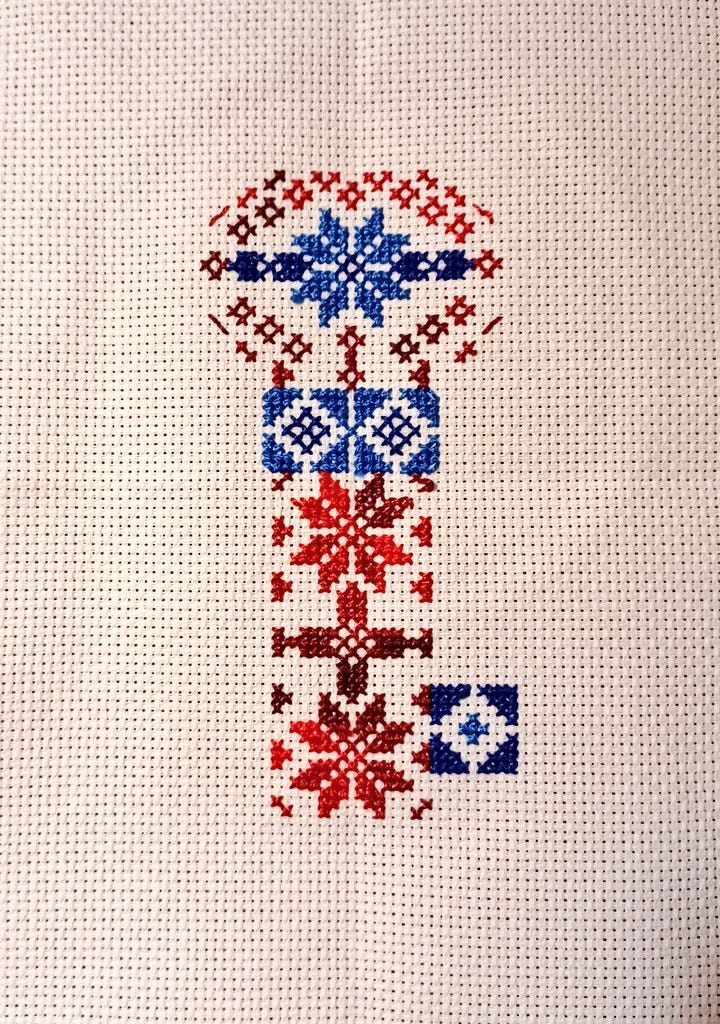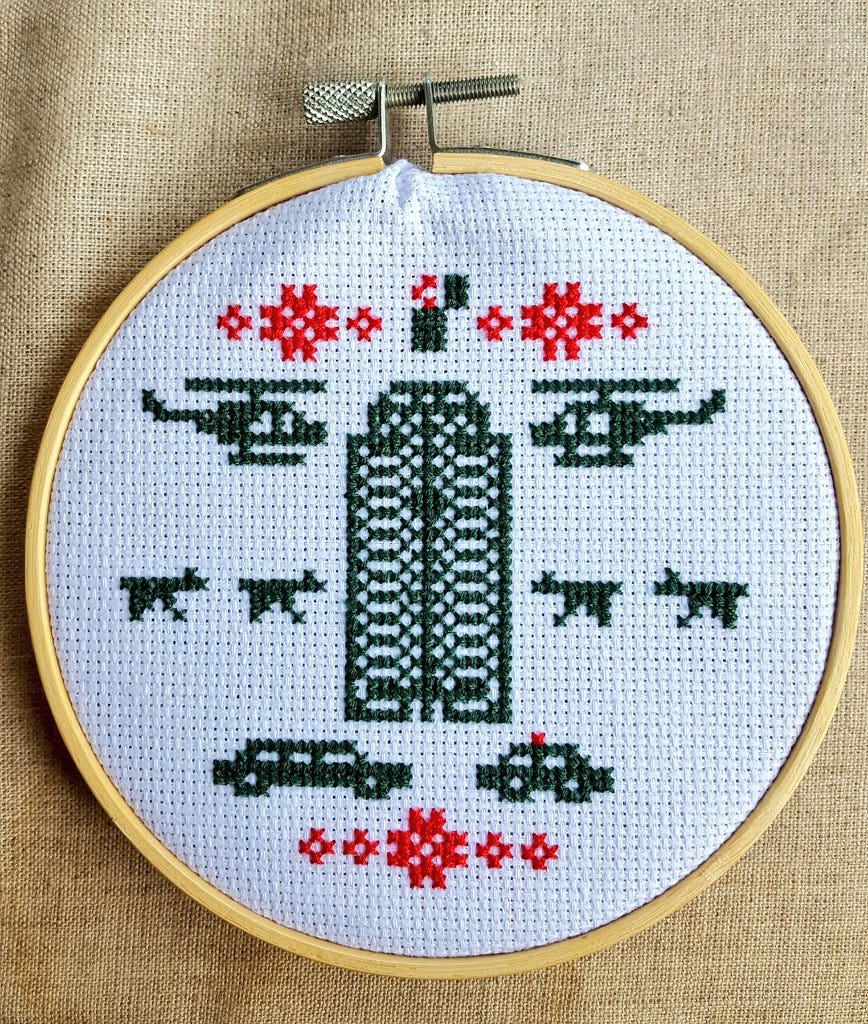It is the dead of night and I am hanging by a thread.
The cloth is dark as a blacklist and the thread is red as blood. Blood that binds generations: blood spilled and blood mourned. I am up in the dead of night because I can’t stop thinking about the blood.
I’m supposed to be asleep but instead I am holding the thread. Rows of diagonal lines form a path and I cross them, x’s marking the spot until they create a pattern. I switch colors: green like olives, purple like flowers. Yellow like sunshine or the flash of a bomb.
This is no cold-blooded pixel: you can touch them, feel them, these tactile memories of motion. Hypnotic geometry from the region that pioneered math, made easy enough for an American to try.
I am doing tatreez: Palestinian traditional embroidery. An ancient craft of an ancient people that Americans are told, by their media and their politicians, do not — or should not — exist.
Tatreez is similar to cross-stitch but rich in motifs particular to Palestine: stars, cypress trees, the key of return (the key to the homes Israelis have stolen). Tatreez preserves Palestinian personal and political histories. On garments, it often conveys village traditions and milestones in the life of the owner. On wall hangings, symbols relay Palestine’s history: its triumphs and tragedies and refusal to bow down.
In 2021, UNESCO recognized tatreez as part of the Intangible Cultural Heritage of Humanity. I wonder where UNESCO is now as Israel destroys ancient monuments in Gaza and Lebanon, to say nothing of tatreez. Is artistry of as little value to them as it is to Israel?
I go online and see a Palestinian living room drenched in blood. The Israeli military has attacked another home, murdering a mother and her children. The remains of a tatreez robe, its threads burnt and torn, lies on the floor.
I pick up my needle, because I’ve seen the damage done, and I cannot close my eyes.
* * *
I started doing embroidery at the start of the pandemic. I cycled through crafts — needle felting, macrame, candle-making — like I was on a dystopian episode of Little House on the Prairie.
In my basement is a box labeled “Mommy’s Pandemic Art” that holds my fleeting pursuits: resin glitter coasters, felted medieval tapestries, a paint-by-numbers depiction of the Roswell UFO crash.
The embroidery, though — that stayed. I kept embroidering long after the order to shelter in place was lifted. I was good at it. But more than that, it eased my soul.
I learned the styles of different cultures: Japanese sashiko and kogin, Hungarian koloscai, Mexican otomi, Uzbek suzani. I followed patterns from different historic eras: British Jacobean crewel, Hapsburg lace. The silk of Vietnam, the wool of Scotland. I embroidered a Roycroft table runner even though I own no Roycroft table. I cross-stitched the plot of Die Hard and hung it on the Christmas tree.
Without intending to, I kept embroidering birds. Maybe subconsciously, I longed to be free — to leave the home without worry or restriction.
Maybe we all long to be free. Birds appear in the crafts of every culture. Maybe birds are what connect us, flying from land to land, unifying the world on a trail of invisible thread.
I learned needle-painting — an intricate form of embroidery that creates a realistic visage — and made the state bird of Missouri. I needle-painted four more birds and arranged them on the headboard of my bed next to quartz crystals that I had dug out of Missouri soil, color-coordinated to match the birds, and pretended I lived in an outdoor paradise.
Embroidery tends to be a winter hobby. Between 2020 and 2024, I abandoned it every year in March and returned to it in October. This was not conscious: the urge left and returned with the change in the weather.
This year, the urge returned early. I got an Etsy gift card for my birthday and blew it all on tatreez kits. I started with simple designs, embracing the pleasure of learning something both new and familiar, then moved into more elaborate patterns.
“Are we going apple picking?” my kids asked, because it is the season.
“We will,” I said, “as soon as I finish recreating the traditional chest panel of the dresses of Ramallah.”
I lost myself in tatreez, grateful for a challenge I could master. Counted cross-stitch is hard: one false move and you have to undo everything. Tatreez teaches patience and fortitude. I watched YouTube tutorials of Palestinian women nimbly sliding the needle through the cloth without poking and pulling, like I did, and adapted their ways. I made fewer mistakes.
There are worse addictions than compulsive crafting. I don’t do drugs and rarely drink. I don’t meditate or go to therapy. When I hear the word “mindfulness”, I want to smack something. My mind is so full it’s exploding. I am all too aware of my surroundings. I am all too lost in the moment and what the moment tells me about loss.
That is where embroidery comes in. After World War I, soldiers suffering shell shock — later known as PTSD — were encouraged to take up embroidery. There are photos of hospitalized soldiers holding hoops, methodically engaged in an activity long regarded as women’s work.
Nurses had discovered that embroidery had therapeutic benefits: the repetition, the colors and textures, the satisfaction of creation. Soldiers could not share their pain, but they could ease it.
People ask how I’m doing. I laugh at the chasm of the question. How is anyone doing?! Climate catastrophes, genocide, the election from hell. Embroidery, though — that I can discuss.
But it is different when it comes to tatreez. For my country is the one funding the country murdering the craftspeople who practice it, and I am aware of that with every stitch.
* * *
I have a small collection of Navajo art I bought during trips to the Four Corners region. It is made by living Navajo artisans. If I had an antique, I’d return it.
My favorite work is a small rug by a weaver named Pauline Lee. Like Palestinian tatreez, Navajo rugs are structured in symbols. My storm pattern rug has four squares symbolizing the four sacred mountains of the Navajo Nation, zigzags symbolizing lightning, and other codes.
I love this rug because it’s beautiful and mysterious. Sometimes I kneel down and trace it line by line, analyzing the construction, wishing I knew how to weave. But it is also a living emblem of the Navajo world and a reminder of the US government’s brutal attempt to annihilate it.
There are stark parallels between what Israel is doing to the Palestinians — a genocide of people and culture — and what the US did to Native Americans (which I discuss in this article.) The parallels are so disturbing that professors have been fired for discussing them.
The movement against teaching accurate US history is often backed by people who don’t want accurate Middle Eastern history taught either. They insist that the nations colonizers tried to annihilate, or are trying to annihilate, are not “real.”
Folk art is a bulwark against that assumption. It is proof of life, and proof of historical tradition — and therefore deeply threatening to invaders.
I am doing nothing impressive in learning tatreez. But I have learned more about Palestinian history while doing it and through studying the origins of the motifs. When I have visitors, I explain to them what I made, and they learn, too.
This should not be a big deal, except that Palestinian art is being censored, including here in St. Louis. This censorship is happening at the same time AIPAC poured a record amount of money to remove my anti-genocide representative, Cori Bush, from Congress, and replace her with a representative beholden to donors serving Israel.
I used to do woodworking at a place called Craft Alliance, but I stopped after they censored an art show on Palestinian culture and canceled the residencies of the artists. I used to go to a local art fair, but this year they banned a Palestinian dance troupe for no reason.
“It's like they're asking us to not exist. That's what I'm hearing. It's just as simple as that. I think it's just a way to erase a culture and erase its people,” said Hanan Hamed, the manager and coach of the troupe.
There is a global narrative being spun and it relies on deceit — and on you not pulling the threads, and seeing the lies unravel.
* * *
In tatreez, blank space tells a story as much as color. There is a pattern in the emptiness, an inverse world created by the twists of geometry.
When you look at tatreez, you wonder about the Palestinian woman who made it. What did she do while she stitched — did she chat with family and friends who are now gone? Did she look out at a neighborhood now bombed into oblivion? What was she trying to say with her design — and is this now the only way left to tell it?
You wonder if the Israeli military killed her. The victims of Israel’s attacks are overwhelmingly children and ordinary civilians, not terrorists.
You gaze into the blankness beside the beauty, the untold tales and ruined lives, the unanswered questions that you are increasingly forbidden to ask, and you run out of words.
But you pick up the needle because there is something inherently stubborn about tatreez — an insistence that you keep going, that you complete the pattern, that you get one small thing right when everything is going wrong.
It is nearly dawn in a year of nightmare days, and the world is hanging by a thread.
* * *
Thank you for reading! This newsletter is funded entirely by voluntary paying subscribers. That allows me to keep it open to everyone, and I don’t paywall in times of peril. If you like what I do, please subscribe!
The patterns and kits used for the tatreez pictured here are from the following shops:









I have a Jewish -Canadian friend who has worked for two decades in Israel teaching science to Palestinian and Israeli students for a living and running "peace camps" with that mix of kids during school holidays. She relates that when you are invited into a Palestinian home, you will be offered food and tea and no one will talk, they will just BE with you until time has passed, and their offerings of hospitality have been consumed. Only then will they speak words of welcome and then conversation. It sounds deeply civilized to me, distilled from traditions that go back not hundreds but thousands of years.
It appears that Perplexity.ai agrees with me.
When visiting a traditional Palestinian home, silence plays a nuanced and important role in the welcome and hospitality offered to guests. Here are some key aspects:
## Respectful Silence
In Palestinian culture, silence can be a sign of respect and attentiveness toward guests. When visitors first enter the home, there may be moments of quiet as the hosts warmly welcome them through gestures and body language rather than excessive words. This allows guests to feel at ease and settle into the space.
## Listening and Observation
Silence provides an opportunity for hosts to attentively listen to and observe their guests, anticipating their needs without the guests having to verbally express them. This reflects the deep-rooted Palestinian value of generous hospitality.
## Creating a Peaceful Atmosphere
Brief periods of comfortable silence help create a calm, peaceful atmosphere that puts guests at ease. This aligns with the Palestinian tradition of making visitors feel "at home" and completely welcome in the space.
## Nonverbal Communication
Much of the initial welcome may be communicated through nonverbal cues like warm smiles, gestures of greeting, and attentive body language. Silence allows these subtle but meaningful interactions to occur without being overshadowed by conversation.
## Reflection of Dignity
Maintaining some silence, especially early in the visit, can be seen as a reflection of the dignity and poise valued in Palestinian culture. It demonstrates composure and allows for a measured, thoughtful approach to hosting.
While silence plays these important roles, it's important to note that Palestinian hospitality is also characterized by warmth, generosity, and engaging conversation as the visit progresses. The initial moments of quiet help set the stage for the rich social interaction that follows.
Citations:
[1] https://www.theatlantic.com/family/archive/2024/03/palestinian-food-diplomacy-gaza/677773/
[2] https://www.hospitality-for-humanity.com/faqs
[3] https://socialtextjournal.org/periscope_article/pedagogy-and-epistemics-of-witness-teaching-palestine-in-a-time-of-genocide/
[4] https://www.cbc.ca/news/canada/chilling-effect-pro-palestinian-1.7064510
[5] https://uniter.ca/view/silencedeath
[6] https://anthrosource.onlinelibrary.wiley.com/doi/10.1111/aman.13925
[7] https://www.eater.com/23942299/hospitality-for-humanity-palestine-israel-hamas-war-interview-reem-assil
[8] https://journals.sagepub.com/doi/10.1177/03064220231219875
Beautiful. Just beautiful. Thank you.